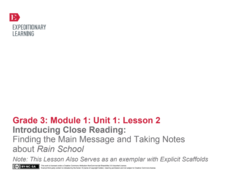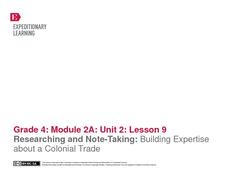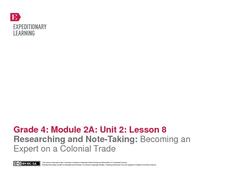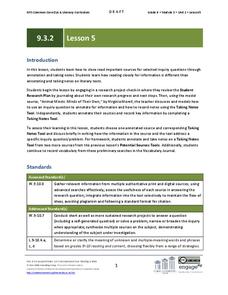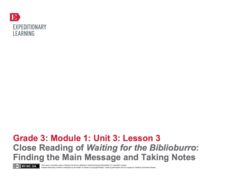EngageNY
Listening Closely and Taking Notes: Colonial Trade Podcast About the Wheelwright
Voices from the past. Young scholars listen to a podcast interview with a historical re-enactor as they continue their research in the eleventh instructional activity of this unit on colonial trade. Applying their close reading skills,...
New York State Education Department
English Language Arts Examination: June 2017
Plants prefer classical music to rock and roll. That's one of the claims in an informational passage that makes up part of a set of standardized assessment questions. The set is part of a larger collection of English language arts tests...
EngageNY
Taking Notes Using a Graphic Organizer: Inferring About Work and Play in Colonial America
What was life like in colonial America? Follow this lesson and your pupils will find out what people in colonial times did for work and for fun. Ask learners to compare and contrast the two texts and explain what the reading helped them...
EngageNY
Taking Notes Using a Graphic Organizer: Inferring About the Importance of Religion in Colonial America
Improve class understanding of colonial times by reading an informational text and filling out the accompanying graphic organizer. Class members work with a partner to read, take notes, make inferences, and synthesize information.The...
EngageNY
Reading and Taking Notes on Colonial Trades
In the tenth instructional activity of this unit, young scholars learn to categorize information as they continue researching their colonial trade. During guided practice, the teacher models how to read informational text slowly while...
EngageNY
Listening Closely and Taking Notes in Expert Groups: Colonial Trade Podcast
The twelfth instructional activity of this unit builds on the skills developed in the previous instructional activity, as fourth graders continue their quest to become experts on colonial trade by listening to interviews with historical...
EngageNY
Introducing Close Reading: Finding the Main Message and Taking Notes About Rain School
This second lesson in a larger unit is perfect for the beginning of the year because it explicitly teaches 3rd graders how to use close reading skills by identifying unfamiliar words, figuring out the gist, and defining important...
EngageNY
Researching and Note-Taking: Building Expertise about a Colonial Trade
Building on the previous activity in this unit on colonial trade, the ninth activity has young experts continuing their research and writing summaries of the information they find. To begin, children participate in guided practice where...
Houghton Mifflin Harcourt
Around Town: Neighborhood and Community: English Language Development Lessons (Theme 3)
Here is a unit designed to support English language development. Scholars speak, move, and write to learn more about topics that focus on community and local concepts. The series of lessons aids to reinforce concepts including consonant...
EngageNY
Researching and Note-Taking: Becoming an Expert on a Colonial Trade
Fourth graders work in small groups to become experts on different colonial trades in the eighth instructional activity of this unit. Working toward the long-term goal of writing a piece of historical fiction, young scholars read...
Curated OER
New York English Language Arts Test: Grade 6
This comprehensive end-of-year language arts test requires that sixth-graders demonstrate their listening, writing, grammar, spelling, and punctuation skills. It includes 9 essay/short answer questions; however, the story, "A Winning...
Curated OER
Researching Skills: Taking Notes
The how and why of note taking is the focus of a four-page worksheet. Tips include how to take notes in class, how to prepare note cards for a speech, how to fill out note cards on readings, and where to keep notes. Whether distributed...
Film English
Theo’s Story
Encourage your class to consider a beautiful short film about a boy named Theo who happens to be visually impaired. Over the course of the lesson, pupils work in pairs, discuss their ideas and the film as a class, view the film, take...
Curated OER
New York State Testing Program: English/Language Arts Book 2, Grade 3 2010
This 3rd grade English/Language Arts standardized test practice worksheet includes multiple choice questions, short answer, and a paragraph to correct. The passage intended for the multiple choise section is not included.
Curated OER
New York State Testing Program English Language Arts Book 2--Grade 7 (2005)
In this New York State Testing Program English Language Arts worksheet, 7th graders listen to an article and answer reading comprehension questions. Students then write an essay response and identify grammatical mistakes in paragraphs.
Curated OER
7th Grade English/Language Arts Practice Test
The Georgia Department of Education provides practice for their Criterion-Referenced Competency Test in English/Language Arts with 30 multiple-choice questions.
EngageNY
Launching The Module: Taking a Stand
Scholars analyze various photos to determine how the people pictured take a stand. They use a Notice/Wonder Note Catcher to help organize their thoughts. Learners then study a Taking a Stand: Frayer Model handout to learn what it means...
California Education Partners
My Five Senses by Aliki
An assessment designed to examine scholars' reading comprehension skills takes place over three days. Starting with a read-aloud of My Five Senses by Aliki, learners then take notes and discuss their most memorable moments with a peer....
EngageNY
Four Corners: Taking a Stand in To Kill a Mockingbird (Chapters 24-26 Plus Synthesis of Scenes in Previous Chapters)
Think outside the box! Scholars work on the Frayer Model, completing boxes for the word integrity. They turn and talk with partners to discuss real-life examples and some from To Kill A Mockingbird. Readers then discuss integrity, taking...
EngageNY
End of Unit Assessment: Analysis of Language Techniques
Watch your language! Scholars work on an end-of-unit assessment in which they demonstrate the language skills they learned. Questions ask readers to work with different types of verbs and moods all about the text in Unbroken.
New York City Department of Education
Grade 5 Literacy in English Language Arts: Should the School Day Be Longer?
Scholars read newspaper articles relating to a longer school day and complete note-taking organizers as they read. They then form opinions and complete outlines before writing essays supporting their point of view.
EngageNY
Grade 9 ELA Module 3, Unit 2, Lesson 5
Once you find and evaluate your sources, it's time to discern the most helpful information. In a research lesson plan based on questions derived from Temple Grandin's Animals in Translation, practice annotation and taking notes.
EngageNY
Close Reading of Waiting for the Biblioburro: Finding the Main Message and Taking Notes
Expose your class to Waiting for the Biblioburro, narrative nonfiction that will act as the bridge between ficiton and informational texts to come. Class members do a close reading of the text, looking at excerpts instead of the whole...
EngageNY
Looking Closely at Stanza 3—Identifying Rules to Live By Communicated in “If”
Just as Bud, from the novel Bud, Not Buddy by Christopher Paul Curtis, had rules to live by, so does the poem, If by Rudyard Kipling, but how do the two relate? Pupils delve deep into the poem's third stanza, participate in a grand...








